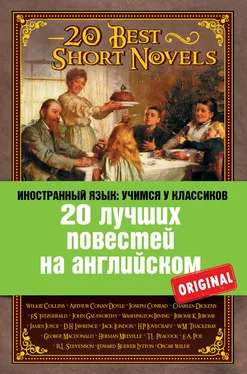But the little group of five which had formed farther up and was engrossing all the watchers’ attention had stopped upon a ledge of rock. The negroes stooped and pulled up what appeared to be a trap-door in the side of the mountain. Into this they all disappeared, the white-haired man first, then his wife and son, finally the two negroes, the glittering tips of whose jeweled head-dresses caught the sun for a moment before the trap-door descended and engulfed them all.
Kismine clutched John’s arm.
‘Oh,’ she cried wildly, ‘where are they going? What are they going to do?’
‘It must be some underground way of escape.’
A little scream from the two girls interrupted his sentence.
‘Don’t you see?’ sobbed Kismine hysterically. ‘The mountain is wired!’
Even as she spoke John put up his hands to shield his sight. Before their eyes the whole surface of the mountain had changed suddenly to a dazzling burning yellow, which showed up through the jacket of turf as light shows through a human hand. For a moment the intolerable glow continued, and then like an extinguished filament it disappeared, revealing a black waste from which blue smoke arose slowly, carrying off with it what remained of vegetation and of human flesh. Of the aviators there was left neither blood, nor bone – they were consumed as completely as the five souls who had gone inside.
Simultaneously, and with an immense concussion, the château literally threw itself into the air, bursting into flaming fragments as it rose, and then tumbling back upon itself in a smoking pile that lay projecting half into the water of the lake. There was no fire – what smoke there was drifted off mingling with the sunshine, and for a few minutes longer a powdery dust of marble drifted from the great featureless pile that had once been the house of jewels. There was no more sound and the three people were alone in the valley.
At sunset John and his two companions reached the high cliff which had marked the boundaries of the Washingtons’ dominion, and looking back found the valley tranquil and lovely in the dusk. They sat down to finish the food which Jasmine had brought with her in a basket.
‘There!’ she said, as she spread the table-cloth and put the sandwiches in a neat pile upon it. ‘Don’t they look tempting? I always think that food tastes better outdoors.’
‘With that remark,’ remarked Kismine, ‘Jasmine enters the middle class.’
‘Now,’ said John eagerly, ‘turn out your pocket and let’s see what jewels you brought along. If you made a good selection we three ought to live comfortably all the rest of our lives.’
Obediently Kismine put her hand in her pocket and tossed two handfuls of glittering stones before him.
‘Not so bad,’ cried John, enthusiastically. ‘They aren’t very big, but – Hello!’ His expression changed as he held one of them up to the declining sun. ‘Why, these aren’t diamonds! There’s something the matter!’
‘By golly! [267]’ exclaimed Kismine, with a startled look. ‘What an idiot I am!’
‘Why, these are rhinestones [268]!’ cried John.
‘I know.’ She broke into a laugh. ‘I opened the wrong drawer. They belonged on the dress of a girl who visited Jasmine. I got her to give them to me in exchange for diamonds. I’d never seen anything but precious stones before.’
‘And this is what you brought?’
‘I’m afraid so.’ She fingered the brilliants wistfully. ‘I think I like these better. I’m a little tired of diamonds.’
‘Very well,’ said John gloomily. ‘We’ll have to live in Hades. And you will grow old telling incredulous women that you got the wrong drawer. Unfortunately your father’s bank-books were consumed with him.’
‘Well, what’s the matter with Hades?’
‘If I come home with a wife at my age my father is just as liable as not to cut me off with a hot coal [269], as they say down there.’
Jasmine spoke up.
‘I love washing,’ she said quietly. ‘I have always washed my own handkerchiefs. I’ll take in laundry and support you both.’
‘Do they have washwomen in Hades?’ asked Kismine innocently.
‘Of course,’ answered John. ‘It’s just like anywhere else.’
‘I thought – perhaps it was too hot to wear any clothes.’
John laughed.
‘Just try it!’ he suggested. ‘They’ll run you out before you’re half started.’
‘Will father be there?’ she asked.
John turned to her in astonishment.
‘Your father is dead,’ he replied somberly. ‘Why should he go to Hades? You have it confused with another place that was abolished long ago.’
After supper they folded up the table-cloth and spread their blankets for the night.
‘What a dream it was,’ Kismine sighed, gazing up at the stars. ‘How strange it seems to be here with one dress and a penniless fiancé!
‘Under the stars,’ she repeated. ‘I never noticed the stars before. I always thought of them as great big diamonds that belonged to some one. Now they frighten me. They make me feel that it was all a dream, all my youth.’
‘It was a dream,’ said John quietly. ‘Everybody’s youth is a dream, a form of chemical madness.’
‘How pleasant then to be insane!’
‘So I’m told,’ said John gloomily. ‘I don’t know any longer. At any rate, let us love for a while, for a year or so, you and me. That’s a form of divine drunkenness that we can all try. There are only diamonds in the whole world, diamonds and perhaps the shabby gift of disillusion. Well, I have that last and I will make the usual nothing of it.’ He shivered. ‘Turn up your coat collar, little girl, the night’s full of chill and you’ll get pneumonia. His was a great sin who first invented consciousness. Let us lose it for a few hours.’
So wrapping himself in his blanket he fell off to sleep.
John Galsworthy
Indian Summer of a Forsyte
And Summer’s lease hath all too short a date.
Shakespeare
In the last day of May in the early ‘nineties, about six o’clock of the evening, old Jolyon Forsyte sat under the oak tree below the terrace of his house at Robin Hill. He was waiting for the midges to bite him, before abandoning the glory of the afternoon. His thin brown hand, where blue veins stood out, held the end of a cigar in its tapering, long – nailed fingers – a pointed polished nail had survived with him from those earlier Victorian days when to touch nothing, even with the tips of the fingers, had been so distinguished. His domed forehead, great white moustache, lean cheeks, and long lean jaw were covered from the westering sunshine by an old brown Panama hat. His legs were crossed; in all his attitude was serenity and a kind of elegance, as of an old man who every morning put eau de Cologne upon his silk handkerchief. At his feet lay a woolly brown-and-white dog trying to be a Pomeranian [270] – the dog Balthasar between whom and old Jolyon primal aversion had changed into attachment with the years. Close to his chair was a swing, and on the swing was seated one of Holly’s dolls – called ‘Duffer Alice’ – with her body fallen over her legs and her doleful nose buried in a black petticoat. She was never out of disgrace, so it did not matter to her how she sat. Below the oak tree the lawn dipped down a bank, stretched to the fernery, and, beyond that refinement, became fields, dropping to the pond, the coppice, and the prospect – ‘Fine, remarkable’ – at which Swithin Forsyte, from under this very tree, had stared five years ago when he drove down with Irene to look at the house. Old Jolyon had heard of his brother’s exploit – that drive which had become quite celebrated on Forsyte ’Change. Swithin! And the fellow had gone and died, last November, at the age of only seventy-nine, renewing the doubt whether Forsytes could live for ever, which had first arisen when Aunt Ann passed away. Died! and left only Jolyon and James, Roger and Nicholas and Timothy, Julia, Hester, Susan! And old Jolyon thought: ‘Eighty-five! I don’t feel it – except when I get that pain.’
Читать дальше
Конец ознакомительного отрывка
Купить книгу












